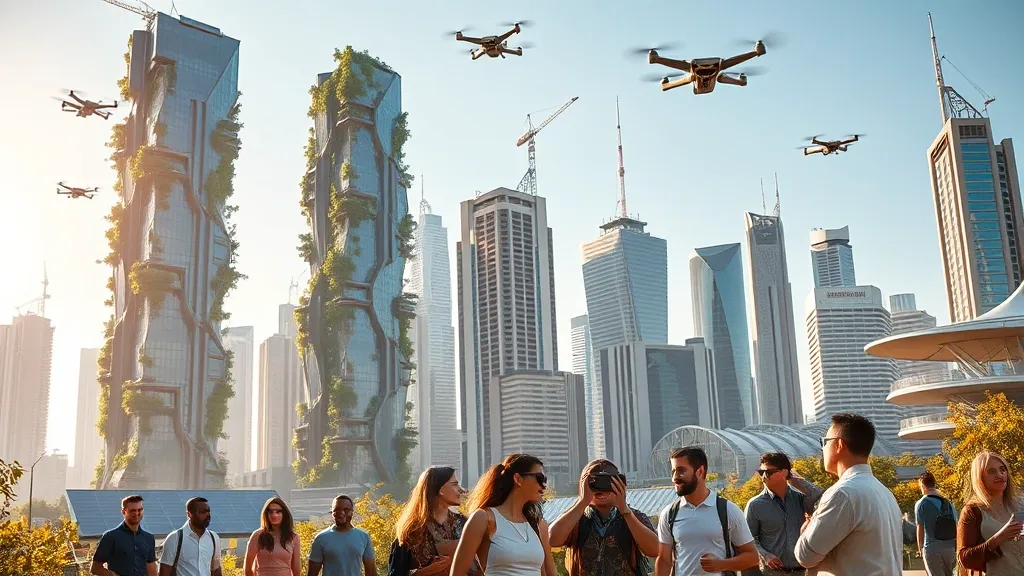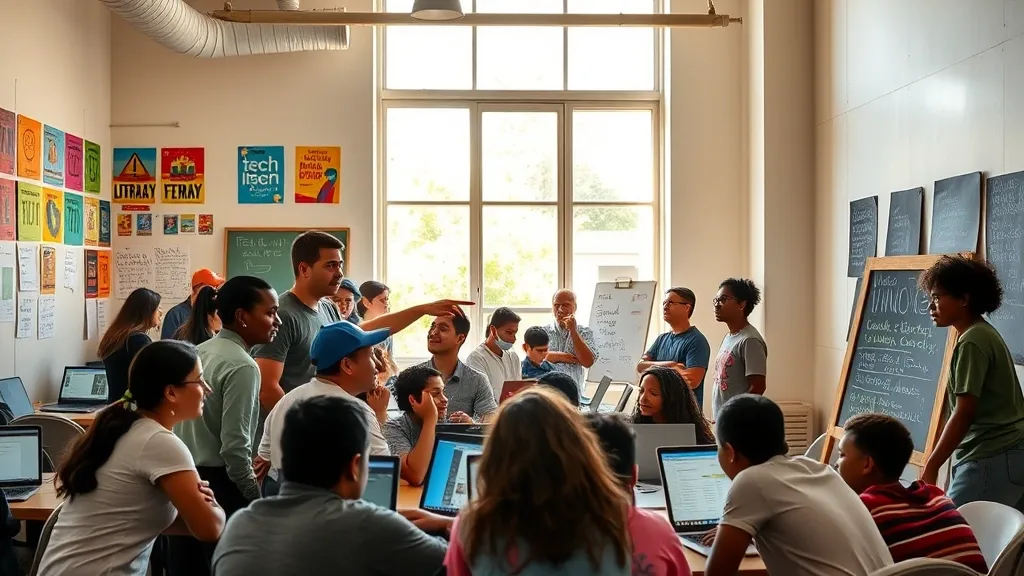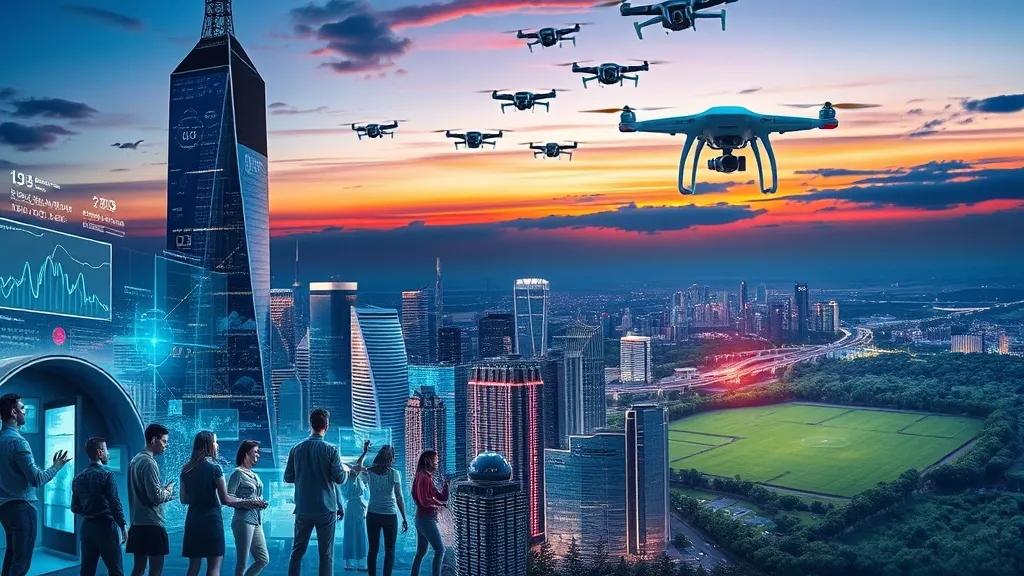Introduction to Future Technologies
As we navigate through the 21st century, the pace of technological advancement continues to accelerate at an unprecedented rate. By 2030, we are on the brink of experiencing innovations that will not only redefine our daily lives but also reshape entire industries. The convergence of artificial intelligence, biotechnology, and renewable energy is set to create a landscape rich with opportunities and challenges.
Future technologies are not merely an extension of current trends; they represent a transformative shift in how we interact with the world around us. From smart cities that utilize IoT (Internet of Things) to enhance urban living, to advanced machine learning algorithms that can predict and mitigate climate change impacts, the innovations on the horizon promise to create a more efficient and sustainable future.
One of the most significant areas of development is artificial intelligence. By 2030, AI will likely become deeply embedded in various sectors, including healthcare, education, and transportation. The ability of AI to analyze vast amounts of data in real-time will lead to more personalized and effective solutions, improving outcomes across the board.
Moreover, the integration of biotechnology with information technology is anticipated to revolutionize healthcare. With advancements in gene editing and synthetic biology, we may witness the emergence of personalized medicine tailored to individual genetic profiles, offering targeted treatments for diseases that were once deemed incurable.
Renewable energy technologies are also crucial in this equation. The transition to sustainable energy sources such as solar, wind, and hydrogen is not only a response to climate change but also a means of achieving energy independence. Innovations in battery storage and energy efficiency will play pivotal roles in this transformation.
In conclusion, as we look towards 2030, it is essential to embrace these future technologies with an open mind and a strategic approach. The innovations we cultivate today will lay the groundwork for a more equitable and sustainable world, fostering growth and improving quality of life for generations to come. The journey may be fraught with challenges, but the potential rewards are immense, and the future is bright for those willing to adapt and innovate.
Key Innovations in Artificial Intelligence
As we look towards 2030, artificial intelligence (AI) stands at the forefront of technological evolution, promising to revolutionize various sectors and enhance the way we interact with the world. Several key innovations in AI are set to shape our future, driving efficiency, creativity, and decision-making processes.
One of the most significant advancements is the development of Generative AI. This technology enables machines to create content, from text and images to music and video, that mimics human creativity. Applications such as AI-driven art generation and automated content creation are not only streamlining production but also democratizing creativity, allowing individuals and small businesses to leverage high-quality outputs without extensive resources.
Another crucial innovation is the enhancement of Natural Language Processing (NLP). With algorithms becoming more adept at understanding context, tone, and sentiment, AI systems can engage in more meaningful interactions with users. This progress is evident in virtual assistants and chatbots that provide personalized customer service experiences, effectively bridging the gap between technology and human emotion.
Furthermore, the rise of Explainable AI (XAI) is addressing the critical need for transparency in AI decision-making processes. As AI systems become more integrated into sectors like healthcare, finance, and law enforcement, stakeholders demand clear insights into how these systems reach conclusions. XAI focuses on developing models that not only yield accurate results but also offer understandable rationales, fostering trust and accountability.
Additionally, advancements in AI Ethics and Governance are becoming paramount as AI technologies proliferate. As we navigate challenges such as bias, privacy concerns, and the implications of automation on employment, establishing frameworks for ethical AI use is essential. Innovations in governance models aim to ensure that AI development aligns with societal values and regulatory standards.
Lastly, the synergy between AI and Edge Computing is set to redefine data processing. By enabling AI algorithms to operate closer to data sources, such as IoT devices, organizations can achieve real-time analytics, enhancing responsiveness and reducing latency. This innovation empowers industries, from manufacturing to healthcare, to harness data more effectively and make informed decisions promptly.
In summary, the trajectory of AI innovations is poised to create transformative impacts across multiple domains, ultimately shaping a future where technology and humanity coexist harmoniously in a rapidly evolving landscape.
Advancements in Renewable Energy
As we look towards 2030, the landscape of renewable energy is poised for significant transformation, driven by technological innovations and a global commitment to sustainability. The urgency to combat climate change has accelerated advancements across various renewable energy sectors, including solar, wind, and energy storage technologies.
One of the most notable advancements is in solar energy technology. The efficiency of photovoltaic cells has seen remarkable improvements, with emerging materials such as perovskite solar cells promising to enhance energy conversion rates significantly. These next-generation cells not only offer higher efficiency but also reduce production costs, making solar energy more accessible worldwide.
Wind energy is also undergoing a renaissance, particularly with the development of larger and more efficient turbines. Offshore wind farms are rapidly expanding, harnessing stronger and more consistent winds over the oceans. Innovations such as floating wind turbines allow for energy generation in deeper waters, unlocking new potential for harnessing wind energy.
Furthermore, energy storage technology is crucial for maximizing the benefits of renewable energy sources. Advancements in battery technologies, particularly lithium-ion and solid-state batteries, are improving energy storage capacity and longevity. These developments enable a more stable energy supply, addressing the intermittent nature of solar and wind energy. Grid-scale energy storage solutions are becoming increasingly viable, promoting the integration of renewables into the existing energy infrastructure.
- Smart Grids: The implementation of smart grid technology facilitates real-time monitoring and management of energy resources, enhancing efficiency and reliability.
- Hydrogen Economy: Green hydrogen production through electrolysis is gaining traction, offering a clean energy carrier that can complement renewable sources.
- Decentralized Energy Systems: Innovations in microgrid technology empower local communities to generate and manage their own energy, fostering energy independence.
The convergence of these advancements signifies a pivotal shift towards a more sustainable energy future. By 2030, we can anticipate a landscape where renewable energy sources dominate, contributing significantly to global energy needs while minimizing environmental impact. This transition not only represents an opportunity for innovation but also a commitment to a sustainable and resilient future for generations to come.
The Impact of Biotechnology on Society
Biotechnology is poised to be one of the most transformative fields in the coming decade, with far-reaching implications for multiple aspects of society. As we move towards 2030, the advancements in biotechnology promise to reshape healthcare, agriculture, and environmental sustainability, ultimately improving the quality of life for millions around the globe.
In the realm of healthcare, biotechnology is revolutionizing the way we approach disease prevention, diagnosis, and treatment. Innovations such as gene editing technologies like CRISPR are enabling scientists to develop targeted therapies for genetic disorders, cancers, and infectious diseases. This precision medicine approach not only enhances treatment efficacy but also minimizes adverse effects, leading to better patient outcomes.
Moreover, biotechnology is facilitating the rapid development of vaccines, as demonstrated during the COVID-19 pandemic. mRNA technology, initially developed for cancer therapies, was adapted to create effective vaccines in record time. This adaptability highlights the potential for biotechnological solutions to address emerging health threats and can significantly reduce the time it takes to respond to future pandemics.
In agriculture, biotechnology is enhancing food security by creating crops that are more resilient to climate change, pests, and diseases. Genetically modified organisms (GMOs) can yield higher production with lower resource input, thereby reducing the environmental impact of farming. This innovation is crucial as the global population continues to rise, necessitating an increase in food production without further straining our limited natural resources.
Furthermore, biotechnology plays a vital role in environmental sustainability. Bioremediation techniques are being developed to clean up contaminated soils and water, utilizing microorganisms to break down pollutants. Additionally, biofuels derived from organic materials present a renewable energy source that can help reduce our dependence on fossil fuels, contributing to climate change mitigation efforts.
However, with these advancements come ethical considerations and societal implications. The potential for genetic discrimination, biosecurity risks, and the need for regulatory frameworks to govern biotechnological applications must be addressed to ensure responsible use. Engaging the public in discussions about the ethical dimensions of biotechnology is essential for fostering trust and acceptance.
In conclusion, biotechnology holds immense promise for shaping a better future by improving health outcomes, enhancing food security, and promoting environmental sustainability. As we approach 2030, it is imperative that we navigate the challenges and opportunities presented by this dynamic field, ensuring that its benefits are equitably distributed across society.


